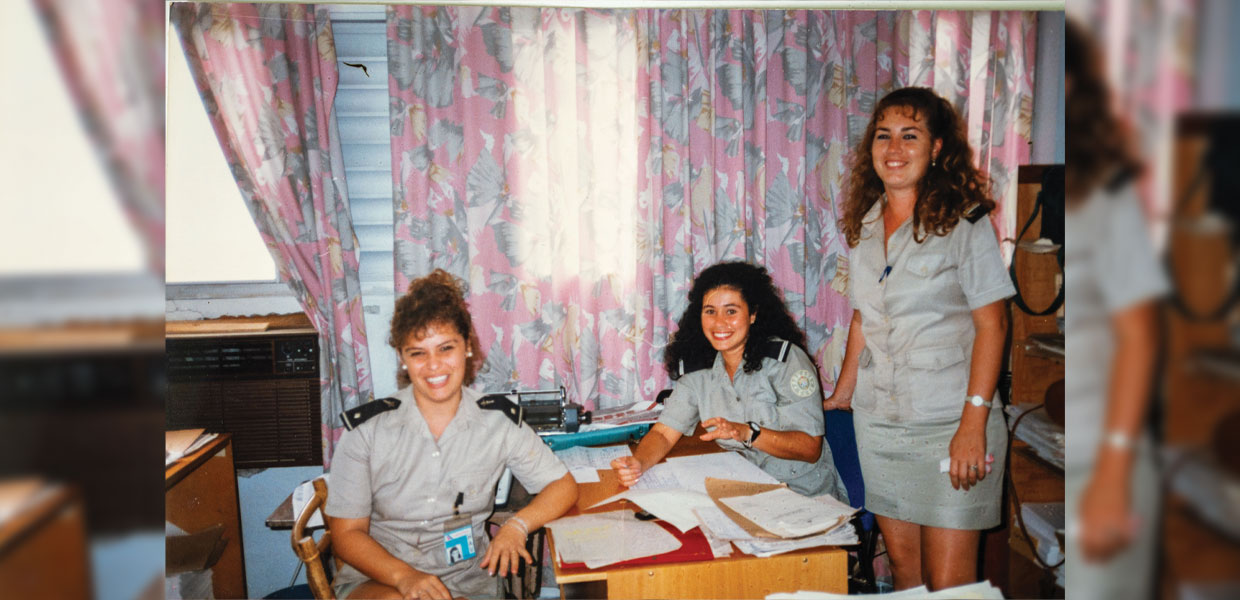
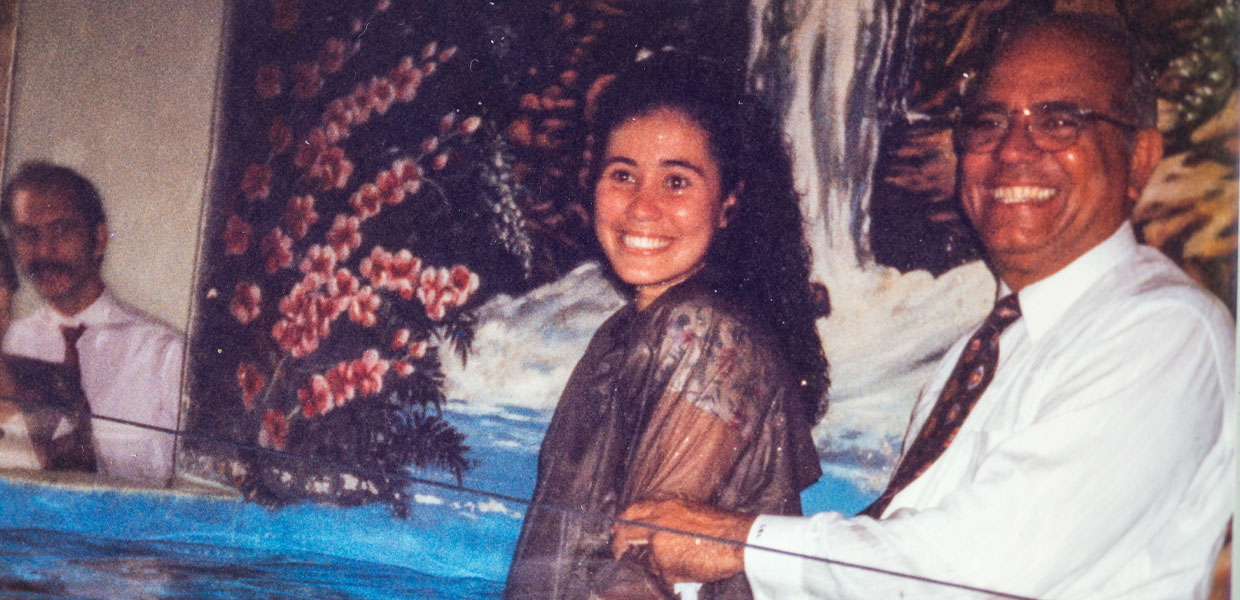
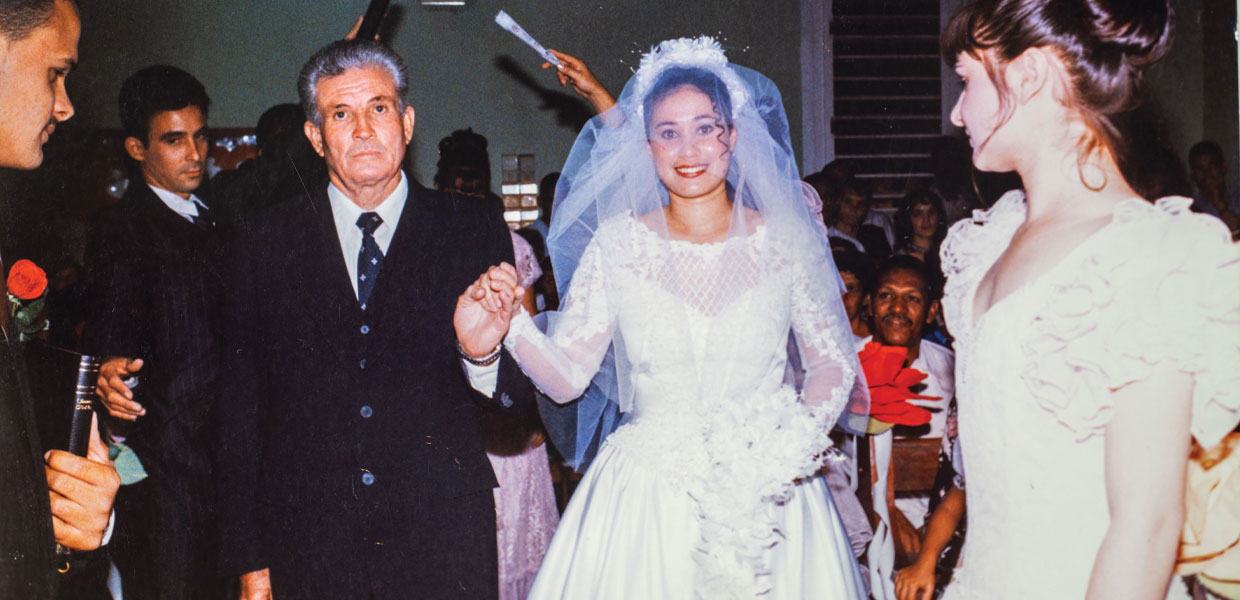
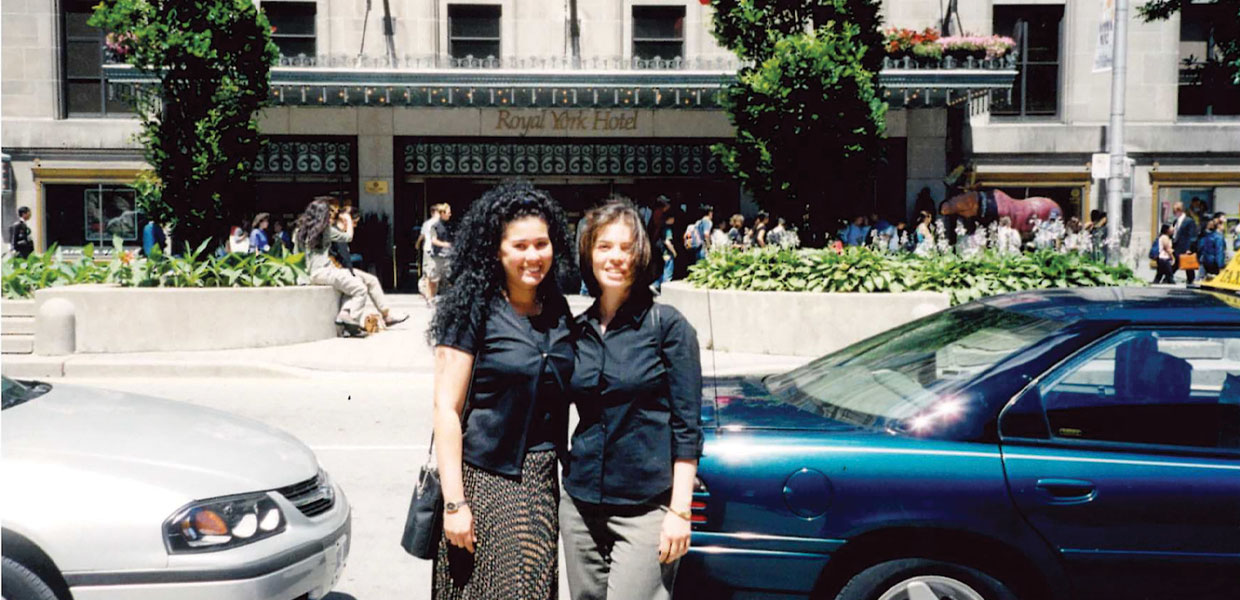
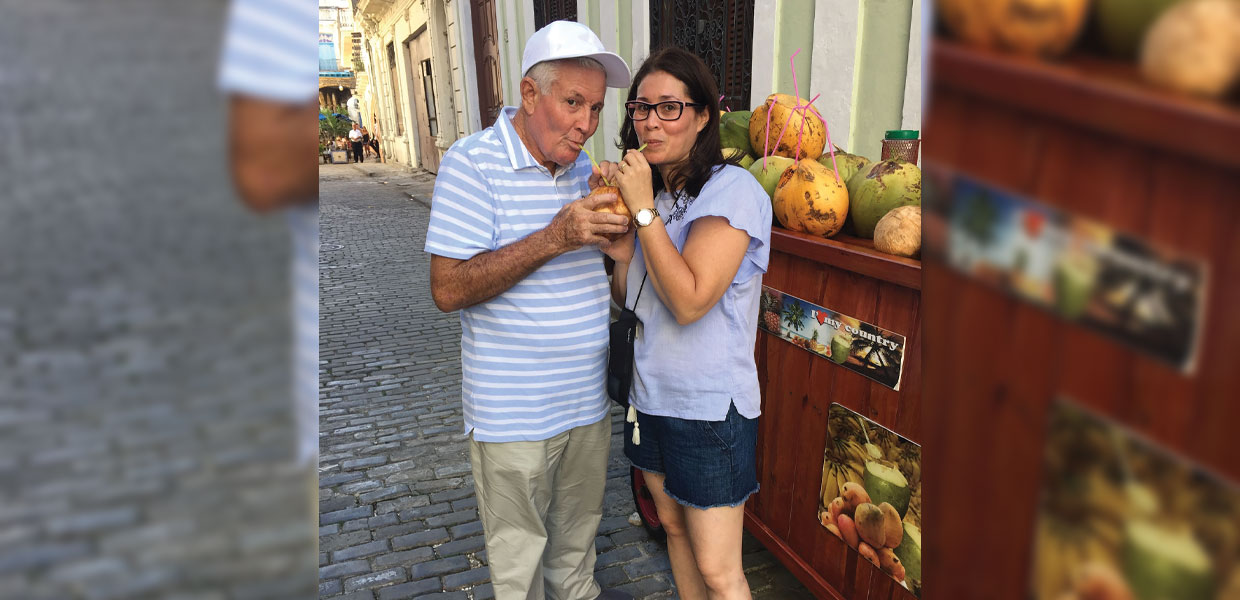
“If you take my daughters to church, I won’t just kill you, I’ll kill them too!” The threat was stern, and the power behind the words would’ve shaken anyone. This conversation was between Yaime Cordova’s father and grandmother, but the command to stay away from church also reached the ears of Yaime and her two sisters, who stood nearby.
Yaime’s father, Antolin, exuded authority not only as a father but also as a devoted Cuban government employee who pledged his allegiance to Fidel Castro. Yaime’s grandmother, Edelmira, was a Christian living in communist Cuba, and her faith was fundamental to her.
Yaime’s father kissed the girls goodbye, leaving them in Edelmira’s care for their vacation. The days passed and when Saturday morning arrived the girls were told, “Get ready for church, we don’t want to be late.” The conflicting commands rang in Yaime’s ears. Should she go to church with her grandmother and risk her father’s fury, or should she stay home? Despite her father’s threats, staying home felt like the wrong answer. The group headed to church and Yaime and her sisters heard stories that rivaled fairy tales. In fact, the girls believed that the Bible and God were one big fairy tale. They knew what was real — Fidel Castro and the Cuban Revolution.
When it was time to return home, the girls silently communicated their thoughts. The unspoken agreement was not to mention church, God, or religion at all. They kept this vow for years, never speaking about the stories they had heard at their grandmother’s house. But one day things changed. One of the girls was brave enough to whisper to her sisters about the stories. As they grew older, they became more curious and wanted to believe the fairy tales from the Bible, just like their grandmother did. But, the conversations about God were hushed and fearful, carefully spoken to protect those they loved.
Yaime’s desire to understand more about God continued into law school. There, Yaime decided to explore church for herself — this time alone, without her sisters or grandmother. She entered the church and took a seat in the back. No one greeted her. No one acknowledged her. She left discouraged by the lack of community. But her curiosity wouldn’t let her give up. She returned to the church on another Sabbath, only to face the same cold reception. Feeling unwanted, Yaime decided she would not return.
After law school, Yaime was assigned to another city where she served two years as a government attorney. Located next to the prosecutor’s office was a Seventh-day Adventist Church. Now working for the government, Yaime believed her childhood lesson had become reality: you couldn’t serve both Fidel Castro and God. Fear of being seen and fired, combined with the fear of an unwelcoming congregation, kept her away from the church.
After completing her two years of service, Yaime returned to Havana and began working in customs, dealing with confiscated items, among other things. One day, a man came into her office and explained that his boxes had been confiscated upon arrival in Cuba. Yaime located the boxes and saw they were filled with Bibles, Bible studies, cassette tapes, and hymnals. The man introduced himself as the director of “Your Story Hour.” Though Yaime was unfamiliar with the ministry, she had heard of the church it belonged to: the Seventh-day Adventist Church. The man extended an invitation to Yaime to attend the youth meetings which the confiscated materials were for. “Will you come to our meetings? Tonight is the last night,” he said. Yaime glanced around the room, knowing the risk involved with even asking her to attend the meetings. “Yes,” she said. “I’ll attend.”
That night she went to the church feeling overwhelmed by curiosity. As she stepped through the church doors, she was greeted, and soon saw the “Your Story Hour” director in the congregation. The initial nervousness of being rejected wore off, and a sense of excitement grew. Here she was in church doing something she wasn’t supposed to, and she was fascinated.
When the sermon ended, she was invited to attend church the next day. She debated what to do. She already had plans to go to the beach with her friends, but something about church seemed better. She cancelled her beach plans and decided to attend the next day.
As she sat in the pew during the Sabbath sermon, Yaime felt a deep longing. She had recently gone through a breakup with someone she had planned to marry, and was struggling with sadness and feelings of worthlessness. But as she listened, she felt new emotions and thoughts take hold. It was as if the pastor knew exactly what she was going through and was speaking directly to her. “When someone breaks up with us, it makes us feel like no one loves us,” said the pastor. “But God loves you so much that He preferred to die on a cross than spend an eternity without you.”
From that day on, Yaime attended church whenever she wasn’t working on Saturdays. She became determined to know more and began studying the “Your Story Hour” materials her office had once confiscated. A devoted student, she sought understanding and eagerly embraced the hope she found in Jesus. She was convicted to join the Church, but fear lingered. After long days at work, she would cry in her room for hours, conflicted by her dilemma. She could be baptized and risk losing her job, or she could keep her job and lose the hope she had gained. She talked with two of her close work friends about her dilemma. They understood the risks and encouraged her not to get baptized.
Yaime appreciated their concern, but she still felt conflicted. The issue weighed heavily on her causing her to toss sleeplessly at night. As she lay awake one night, she cried out to God in desperation. “Please God! Please show me what to do.” She opened her Bible, and the story of Esther met her eyes. As she read the story, she was inspired by Esther’s willingness to sacrifice herself for her people. Prayerfully, Yaime followed Esther’s example and fasted for three days. At the end of the three days, she knew her decision: she would be baptized. She believed that just as God provided for Esther, He would provide for her.
Yaime shared her decision with her work friends, who didn’t try to dissuade her. On Sabbath, as she entered the baptismal pool, her friends sat in quiet solidarity in the back pew. They understood that Yaime’s commitment meant she could no longer work on Saturdays, so they scheduled a meeting with her boss to discuss the matter.
As Yaime and her two friends entered the boss’s office, Yaime’s heart raced. Her job, and possibly her career, was at risk. “Yaime is a Seventh-day Adventist now,” one of her friends said bluntly. Her boss was irritated. “And what does that mean?” he asked. If Yaime’s friend was nervous, she didn’t show it as she advocated for her friend. “She can no longer work on Saturdays,” her friend replied. The room fell silent as the tension built. Finally, the boss said, “What am I supposed to do about that?” Her friends suggested they would cover Yaime’s Saturday shifts. Yaime added that she was willing to work on Sundays. After considering the proposal, her boss agreed. Eventually the government shifted to a Monday-through-Friday work week meaning no one had to cover Yaime’s Saturday shifts.
While many at work and in her family knew about her faith, Yaime had kept it secret from her father. Would her father be so enraged with her decision to believe in God that He would fulfill the promise He had made many years ago? She didn’t want to tell her father. The thought of his reaction kept her silent. But, she knew she had to tell him before he found out some other way. For a month Yaime prayed for strength to tell him.
When she finally confronted her father, her stomach twisted with anxiety. “Papi, I have been baptized into the Seventh-day Adventist Church because I love Jesus,” she said. Immediately her father exploded in anger. He screamed that she would lose her job, calling her ignorant. As she listened to her father berate her, her lip quivered, and silent tears rolled down her face. Her father then began to bang his head into the wall repeatedly, as if trying to knock sense into Yaime’s head through his own. Deflated, Yaime eventually left.
A few days later, Yaime received a call — her father had been taken to the hospital with a heart attack. Yaime burst into tears, blaming herself for the medical emergency, and believing her decision to be a Christian had broken her father’s heart not only metaphorically but literally.
Her father recovered, but they never spoke about her decision to become a Christian again. Yaime continued to excel at her job. Despite the general sentiment about Christians in Cuba, her coworkers trusted Yaime and gave her more important and more frequent assignments than others. Another change in her job was she no longer oversaw religious disputes. Instead, they were reassigned to Yaime’s friend. Yaime trained her friend to use Cuban law to allow Christian materials from all denominations through customs. By doing this, Yaime helped bring significant religious materials into communist Cuba.
Alongside her professional success, Yaime’s social life blossomed. She began assisting with youth events at her church and spent more time with the church youth director. After two years they decided to get married.
Excited to plan her wedding, Yaime asked her father to walk her down the aisle, but he firmly refused. Her father was uninterested in even attending the wedding since it would take place in a church. However, after much prayer from Yaime, her father showed up at the dress rehearsal, and then walked her down the aisle on her wedding day.
Yaime’s marriage was strong except one point of contention: Yaime’s husband wanted to leave Cuba, but Yaime wanted to stay. One of Yaime’s sisters was already in the United States and Yaime had heard of the abundant food, internet, and so many other things that she considered luxuries. When she was given the opportunity to attend the 2000 General Session in Toronto and reconnect with her sister, she happily agreed.
In Toronto, Yaime saw a new world, much different — and in many regards better – than Cuba. She began to see why her husband wanted to leave Cuba. When Yaime returned to Cuba she expressed a desire to leave as well, but before they could seriously discuss leaving, Yaime became pregnant.
The birth of her daughter, Melissa, who was born with Down syndrome, was a transformative time, not just for Yaime, but for her father as well. As she sat in her hospital bed in a room shared with other patients, her church family showed up. Though many had very little, they generously brought Yaime food daily. The church also provided food to the other patients in the room. These thoughtful acts revealed a generous spirit that began to change Yaime’s father’s view of the Church. He began to see Christians, once viewed as anti-government or anti- Castro, as compassionate and generous.
Shortly after Melissa’s birth, Yaime’s husband was accused of preaching against the Cuban government. Though he had only shared the Gospel, the accusations increased their desire to leave. After three years, the family secured U.S. visas and arrived with little more than the clothes on their backs.
Yaime and her family settled in the Atlanta, Georgia, area, where she earned her paralegal degree and worked for several years. In 2017, Yaime began working at the Southern Union Conference in the Communication Department. While some of her family immigrated to the U.S. and other countries, her father, loyal to Cuba, remained.
During COVID-19, Yaime’s father became ill and was hospitalized. When Yaime received the call, though overwhelmed with sadness and worry, she felt deeply impressed to share the Gospel with her father. After saying a quick silent prayer for guidance, Yaime shared the entire Gospel with her father over the phone in the span of just five minutes.
Yaime longed to see her father and share her faith in person, but the borders were closed. She prayed unceasingly that her father would accept Jesus into his life. When she received the call that he had passed, she also learned her father accepted Christ before his death.
Grieving her father’s death, Yaime doubted whether he had truly accepted Jesus. She prayed for reassurance that she would see him again in Heaven, asking for signs from God. For days, she prayed for confirmation. Her husband urged her to trust the signs she had already received, but Yaime insisted on one more. She prayed, “God, this is the last time I ask for a sign that my father accepted You.” Later that day, the phone rang. It was someone who she considered a spiritual mentor. Expecting the usual greeting, “Mi hija preciosa,” Yaime was stunned when he said, “Mi hija, your father is in Christ.” He explained that he felt led to share those words with her. Yaime, believing him, accepted this as the answer to her prayer and kept her promise not to ask for another sign.
Much of Yaime’s father’s life was lived in opposition to the very faith that he would eventually join. Yet, in the final moments, he found peace and reconciliation with God — peace that Yaime had prayed for relentlessly. In the moment he accepted God, the years of struggle, doubt, and distance gave way to a quiet victory. Yaime knows she will see her father again — no longer the man he once was but transformed through the Savior who waited for him all along.
Southern Union | January 2025



Comments are closed.